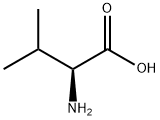All AbMole products are for research use only, cannot be used for human consumption.

L-Valine is a kind of branched-chain amino acids (BCAA). Animal cannot synthesize it by itself. It must be obtained from the diet to meet their nutritional needs. Therefore L-valine belongs to the essential amino acids.

Food Frontiers. 2024 Nov 15.
hUCMSCs Regulate Bile Acid Metabolism to Prevent Heart Failure–Induced Intestinal Injury by Inhibiting the Activation of the STAT3/NF-κB/MAPK Signaling Pathway via TGR5
L-Valine purchased from AbMole

Cell Prolif. 2024 Jul 02.
Transcription factor EB reprograms branched-chain amino acid metabolism and promotes pancreatic cancer progression via transcriptional regulation of BCAT1
L-Valine purchased from AbMole

Front. Immunol. 2024 Jun 24.
L-valine derived from the gut microbiota protects sepsis-induced intestinal injury and negatively correlates with the severity of sepsis
L-Valine purchased from AbMole
| Molecular Weight | 117.15 |
| Formula | C5H11NO2 |
| CAS Number | 72-18-4 |
| Solubility (25°C) | Water 25 mg/mL |
| Storage | 2-8°C, sealed |
| Related Products |
|---|
| 2-Deoxy-2-fluoro-D-glucose
2-Deoxy-2-fluoro-D-glucose is a radiolabeled glucose analog, which is commonly used in medical imaging techniques such as positron emission tomography (PET) scans. |
| 2-Bromo-4-chlorophenylacetic acid
2-Bromo-4-chlorophenylacetic acid is a biochemical reagent. |
| CPN-351 TFA
CPN-351 TFA is a selective pentapeptide antagonist of human NMUR1 with a pA2 of 7.35. CPN-351 TFA can be used for the research of inflammation. |
| 5-Phenyluracil
5-Phenyluracil is a pyrimidine derivative, a class of heterocyclic aromatic organic compounds crucial in biochemistry. It serves as a synthetic nucleoside analogue, meaning it mimics the structure of naturally occurring nucleosides like uridine. This structural similarity allows it to participate in biochemical reactions, often interfering with normal cellular processes, making it a valuable tool in studying nucleic acid metabolism and developing antiviral and anticancer agents. |
| 7-Deoxyloganin
7-Deoxyloganin is a biosynthetic precursor of Loganin. 7-Deoxyloganin undergoes hydroxylation catalyzed by 7-deoxyloganin 7-hydroxylase, a cytochrome P450-dependent monooxygenase, to produce Loganin. |
All AbMole products are for research use only, cannot be used for human consumption or veterinary use. We do not provide products or services to individuals. Please comply with the intended use and do not use AbMole products for any other purpose.


Products are for research use only. Not for human use. We do not sell to patients.
© Copyright 2010-2024 AbMole BioScience. All Rights Reserved.
